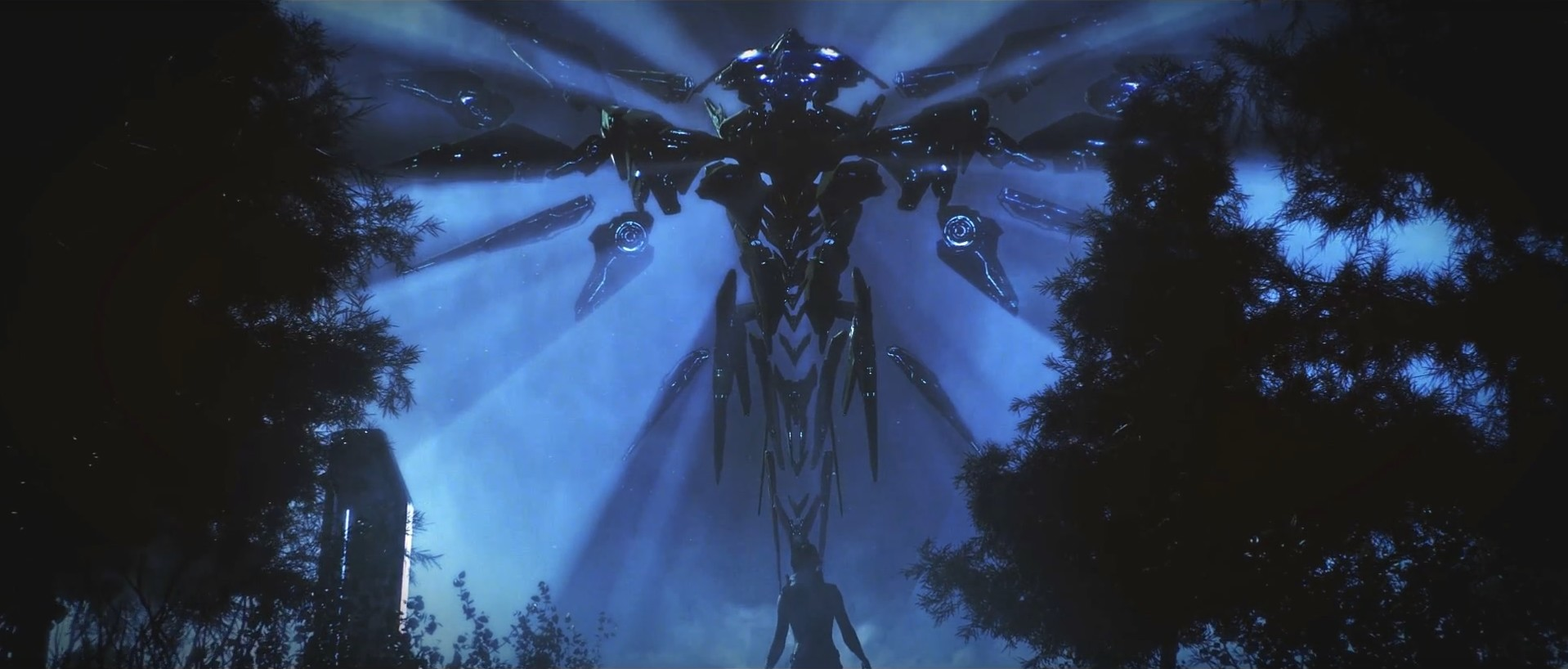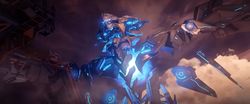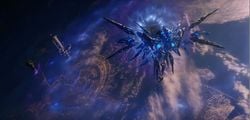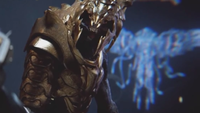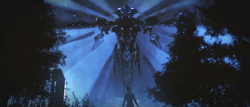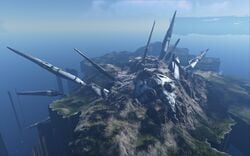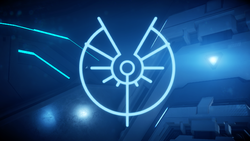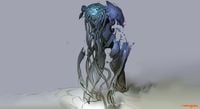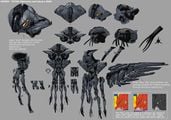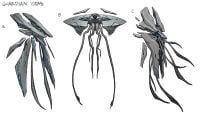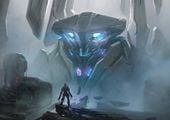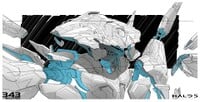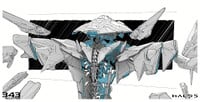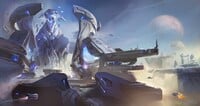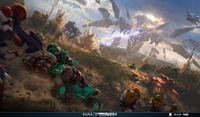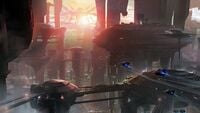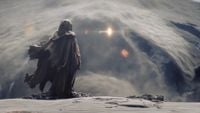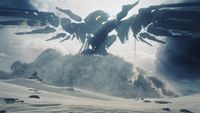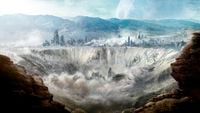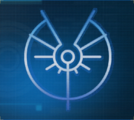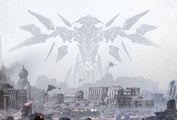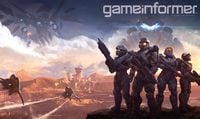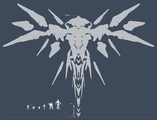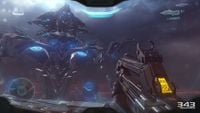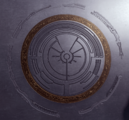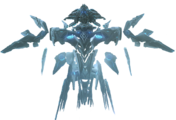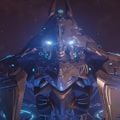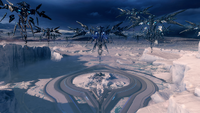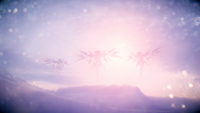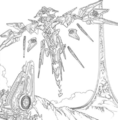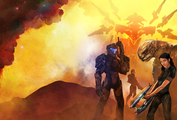Guardian Custode
From Halopedia, the Halo wiki
| Guardian Custode | |
|---|---|
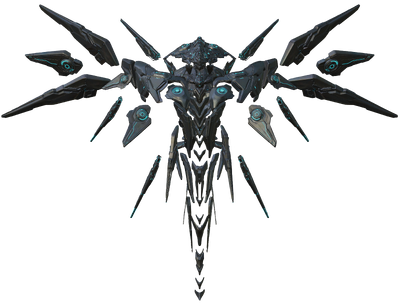
| |
| Overview | |
|
Role: |
|
|
Height: |
|
|
Mass: |
|
|
Armament: |
|
|
Manufacturer: |
|
- 031 Exuberant Witness: "A single Guardian can effectively police a solar system. This show of force is unsettling."
- Olympia Vale: "I'm sorry, 'police'? 'Show of force'?!"
- 031 Exuberant Witness: "Indeed. Guardians are how the Forerunners enforced peace on the lower systems."
- — 031 Exuberant Witness and Olympia Vale, after Cortana called several Guardians to Genesis.[2]
Guardian Custodes,[3] commonly known simply as Guardians, are powerful Forerunner constructs built to enforce the Mantle within the ecumene.[1] Custodes are part of a wider category of policing constructs known as Peacemakers. Along with the Preceptors, the Guardians were classified as tier-two Peacemakers that were largely used to enforce order among the Forerunners' lesser subject species rather than Forerunner-inhabited systems,[3] achieved through the utilization of EMP blasts that disarm conventional military forces and the firing of lethal beams that can kill the populace of cities or destroy entire worlds as a last resort.[6][4]
Manufactured by the Minoris Assembler Vats, the Guardians were controlled by ancilla and operated through their connection to the Domain.[3] In October 2558, Cortana took control of the Guardians to enforce the will of her Created until her demise, leaving them deactivated.[2][7][4][8][9]
Overview[edit]
Design details[edit]
- "Whoa. They built them big, didn't they? Figure that's the Guardian?"
- — Spartan Edward Buck, upon first spotting a Guardian.[10]
The body of the Guardian Custode is variable and ever-changing, shaping itself to awe, inspire, and maximize effectiveness of all defensive systems. Generally, Guardians have a segmented body and elaborate, phoenix-like wings consisting of multiple segments - very similar in appearance to Abaddon, the knowledge engine of the Precursors. They possess a head that is vertically roughly elliptical, topped with a broad, vaguely conical protrusion and a roughly humanoid face similar to that of the Promethean constructs. The appearance of the Guardians unnerved many Forerunners, though all attempts to change their look were unsuccessful.[3][4] The Guardians are enormous constructs, measuring just over 1,412 meters (4,635 feet) in height,[1] with a mass of two hundred million metric tons.[3]
They are capable of concealing themselves underground,[11] underwater,[12] and under lava, and are also capable of traveling through slipstream space.[13] The wings of the Guardians, known as "focus wings", contain energy condensers which draw power from the surrounding quantum vacuum. They also contain effectors which magnify the Custode's electromagnetic pulse.[3] Guardian shielding is capable of withstanding the attack from a human frigate's Magnetic Accelerator Cannon, as well as numerous missiles.[14] Guardians had the authority to plant assembler vats on the worlds they monitored, which would eventually grow and expand to staging areas and factories for the lesser Sentinels and weapon-ships that served them.[3]
The constructs have no crew and instead each Guardian is controlled by an ancilla who inhabits the Custode. These ancillas have limited personality and empathy, having grown strange and aloof. Service as a Guardian and deep synchronization with the Domain reshaped the minds of the ancillas into a form that was considered best suited to serve the Mantle of Responsibility and enforce the prime directives that had first been outlined when even the Forerunners were young. Guardians were connected to the Domain's overwatch network, which allowed them to reflexively counter many threats to the ecumene long before they gained the attention of Warrior-Servant commanders.[3] When later used by human Smart AIs of the Created, the AIs found the Guardians to be disturbing and their inner workings beyond understanding - with the residing ancillas uncooperative to Created influence. During this time, the Guardians were under the sole control of Cortana, with only a very limited amount of power relinquished for Created AIs - provided they still followed Cortana's overall directives. Despite this, some of the AIs in question made use of the Guardians' links to the Domain to enhance their own knowledge and understanding.[4]
Guardians were closely attuned to the ecumene's legal authorities, with the Domain ensuring that the constructs were often available to assist or monitor their activities. Through their connection to the Domain, the Guardians recorded the feats and struggles of those under their protection into the archives of the Domain. Occasionally, Guardians would take independent action to serve a greater purpose when the Domain resonated with these events.[3]
Armaments[edit]
- "Guardian's got a hell of a singing voice."
- — Edward Buck, as a Guardian prepares to fire its disruption generator.[15]
The Guardian Custode's primary weapon is a single disruption generator,[3] a devastating weapon capable of destroying infrastructure caught in its blast.[15] The Guardian is equipped with two attenuation pulse emitters—a multi-vector electronic warfare weapon[3] that can instantaneously neutralize local power networks through a series of debilitating pulses,[1] capable of even disabling Forerunner systems.[3] However, while their weapon is thorough, the damage it causes is not irreparable and can be repaired with time, particularly by Huragok.[16]
Guardians are also armed with six converging beam cannon emitters,[3] weapons commonly found on Forerunner warships that emit tendrils of energy that track enemy vessels and create a path for antimatter streams to pursue.[17] While six of these beam cannons were more than adequate to defeat the fleets of primitive capital ships, they were of little use when the Guardians faced Forerunner warships infested and captured by the Flood.[3] However, the energy produced when multiple Guardians concentrate the beams of these weapons together is sufficient to destroy a planet in mere seconds by cracking open its mantle and exposing its core, as seen in the annihilation of Doisac.[18]
Variants[edit]
- A variant of the Guardian was viewed by Thel 'Vadam in 2558.[19]
Roles[edit]
- Jameson Locke: "Where's that Guardian headed, Cortana?"
- Cortana: "Off to bring peace."
- — Jameson Locke and Cortana.[13]
The Guardians were classified as tier-two Peacemakers, specifically purposed for security, protection, and enforcement roles within the Ecumene. However, the Guardian Custodes were first used as tenders and recorders of the Precursor legacy, though this purpose has long since faded out of living memory. While efficient protectors and enforcers, Guardians also served as immaculate record keepers, adding the history of those under their protection to the Domain's archives.[3][4] As their use continued, the Forerunners added multiple modifications to the original design template, eventually retooling them as constructs of planetary pacification.[4]
The Mantle of Responsibility, the philosophical system adhered to by the Forerunners, was based around the belief that the most technologically developed species was charged with the stewardship of life throughout the Milky Way galaxy. As such, the Forerunners considered themselves the Mantle's upholders. However, as part of the Mantle's "code", competition and conflict was allowed as long as it did not threaten galactic biodiversity. As such entities proved to be a threat to the Forerunners' hold of the Mantle, the Guardians were designed to police the so-called "lesser" planetary systems and enforce the Mantle's edicts on non-compliant or overly aggressive species. Guardians were utilized throughout Forerunner history to suppress rebellions or were deployed in advance as an imposing threat of force. However, they ultimately proved useless against the parasitic Flood.[1]
Guardians were designed with multiple roles and functions, though their primary purpose was the monitoring and subjugation of all local power networks on subject worlds. If deemed necessary, Guardians could instantaneously neutralize these power networks through a series of debilitating pulses that incrementally increased in power.[1] A single Guardian was often enough to effectively police an entire planetary system,[2] though the deployment of multiple Guardians at one location allowed the constructs to strategically coordinate their strike, rendering all but the most sophisticated foes completely ineffective. This method of control was largely unchallenged by other species in the galaxy.[1]
History[edit]
Tools of the Mantle[edit]
The Guardians were developed and created by the Forerunners to enforce the Mantle of Responsibility by keeping "lesser" systems in line. The constructs were first deployed many millennia prior to the Forerunner-Flood war,[1] created by the Forerunners before the time of the ecumene as tenders and recorders of the Precursor's legacy. However, this purpose has long since passed out of living memory.[3][4]
One such action against another species was the one that formerly inhabited the world of Netherop during the Forerunner-Precursor war. While this species was only Tier 6 at best, Precursor fugitives had taken refuge on the planet. The Precursors were able to use the Divine Hand to destroy the Guardian, leaving its remnants on the planet, but at the cost of destroying the indigenous civilization and Netherop itself.[20][21]
During the Forerunners' war with the Flood, Guardians were used in an attempt to combat the Flood but proved useless against the biological parasite.[1] While the Guardians' weapons proved devastating against the fleets of "lesser" species, they were no match against the Forerunner warships captured by the Flood.[3] As the Flood brought on the fall of the ecumene and the near-extinction of the Forerunners themselves, the Forerunners buried the remaining Guardians on isolated shelter worlds. With the firing of the Halo Array in 97,445 BCE, the Guardians were left behind when the remaining Forerunners left the galaxy; the constructs would remain dormant on their shelter worlds until called upon to serve the Mantle once again.[1]
The Guardian located on Sanghelios beneath the Csurdon Sea would later be found by the native Sangheili dive-hunters and fishing skiffs before the species even became space-faring. Nearby elders built fortresses to observe and protect the Guardian's location, which they deemed sacred. The city of Sunaion was built over the Guardian's location in the sea as a temple to worship the construct and its creators. The Covenant later explored the Guardian for many years in an effort to learn of the construct's nature, but their attempts proved fruitless.[22]
At some point after the shield world of Sarcophagus was colonized, the Office of Naval Intelligence set up Project GOLIATH to study the Custodes, with Lucy-B091 having some level of involvement with the project.[23]
Created uprising[edit]
- Main articles: Created uprising, Cortana Event
- "She calls the Guardians to serve her!"
- — The Warden Eternal, referring to Cortana.[10]
In 2558, Cortana, who had been restored within the Domain and come to believe that the Created — human artificial intelligences — were the true inheritors of the Mantle of Responsibility, intended to use the Guardians to enforce the Mantle among all the galaxy's species. She thus began to activate the Guardians across the galaxy and summon them to the nexus of her power at Genesis.[13] Sometime after Dr. Catherine Halsey was rescued from Onyx, she discovered a signal that was being bounced around several locations across the known galaxy. One of the sources of the signal caused violent seismic activity on an unknown human colony, leaving only the symbol of the Guardians. Later, in 2558, Halsey helped the Office of Naval Intelligence access her data archive, leading to ONI hiding the presence of the Guardians from humanity.[24]
In October later that year, Guardians emerged on at least twelve human colonies, including Meridian, Conrad's Point, Ursa IV, and Laika III, as well as other worlds inhabited by species of the former Covenant. These colonies suffered greatly from the devastation caused by the constructs' activation.[25]When Blue Team boarded a Guardian on Meridian, the UNSC held Blue Team's leader, John-117, responsible for the attacks. Fireteam Osiris, led by Jameson Locke, was assigned to hunt him down.[11] Later, Fireteam Osiris was tasked with retrieving a Constructor in a Forerunner structure on Sanghelios in order to activate a Guardian that had been buried under the nearby Csurdon Sea.[26] Soon, all of the Guardians that had been awoken would soon be called to Genesis, and then be dispersed throughout human space, to serve the reclaimed Mantle of Responsibility once again. Guardians subsequently participated in the Subjugation of Earth[13] and one was sent back to Sanghelios when the population refused to surrender as per Cortana's demands. The Guardian's EMP blacked out the entire planet and the next morning, Arbiter Thel 'Vadam received word of the Guardian deploying Prometheans to pacify entire cities that actively resisted the Guardian.[27]
Overall, the Created made extensive use of Guardians to enforce their vision of peace on the Milky Way - though even at their height, the Guardians answered only to Cortana.[4] During the Battle of Cassidy III, a Guardian was summoned to the planet by the AI Leonidas. The Guardian began destroying Hole in the Wall while Quick to Adjust repaired the EMP damage to the colony's escape craft, allowing them to escape. Through Leonidas, the mayor agreed to surrender and accept the Created's subjugation, though Leonidas refused to let Alpha-Nine leave in their Condor. After Kojo Agu destroyed the tablet holding Leonidas, the Guardian attacked the retreating ship and managed to knock out its power with the Guardian's attenuation pulse weapon. However, in doing so, the Guardian drained a tremendous amount of its own energy, giving Quick to Adjust the time it needed to repair the Condor, so they could escape.[28]
On October 29, Cortana arrived at Zeta Halo in a Guardian and Professor Montgomery Marie picked up a radio transmission of Cortana humming Préludes No. 4: Les sons et les parfums tournent dans l'air du soir before becoming aware of the situation. As the Guardian hung over Zeta Halo, the music suddenly came from every individual piece of communications equipment in the base at ear-splitting level, heralding Cortana's arrival and the start of a new war.[29]
A Guardian activated on the shield world of Sarcophagus during the Second Onyx conflict. The shield world's inhabitants managed to destroy the Guardian with the help of Prone to Drift and returned Sarcophagus to its slipspace bubble to protect themselves from further incursions by the Created.[30]
In early April of 2559, a Guardian intercepted and captured Installation 09 en route to the Soell system from Installation 00. On the surface of the Halo, the Guardian confronted Professor Ellen Anders, who had gained control of the ring during the UNSC Spirit of Fire crew's war against the Banished on the Ark.[31]
A Guardian was sent to Reach in early October 2559, to investigate a slipspace anomaly following the opening of the Ark portal on Reach by the Keepers of the One Freedom and the Banished.[32]
During the Banished and other Jiralhanae factions' resistance against the Created at Oth Sonin system,[33] Cortana sent eight Guardians to Doisac where they completely destroyed the planet and devastated its moons, such as Warial, in an act of genocide when Atriox refused to surrender on behalf of the Jiralhanae,[18] killing billions.[33][34]
In November 2559, the UNSC and the Swords of Sanghelios sought a weapon on Netherop that once been used to destroy a Guardian in ancient times in the hopes of using it against Cortana and her forces.[35] It was later realized that the weapon had been created by Precursor fugitives hiding out on Netherop from the Forerunners during the Forerunner-Precursor war.[21] Recognizing just how dangerous the weapon was, the humans and Sangheili gave it to the Banished in the hopes that they would destroy themselves or Cortana with it.[36] The Defenders of the Sanctum appeared to have found the remains of the Guardian destroyed by the Precursor fugitives and moved the pieces of it into the Sanctum of the Ancients, likely due to their worship of the Forerunners as gods.[37]
During his time on the Ark,[citation needed] Atriox learned of the secrets within Installation 07, the Xalanyn. He managed to defeat the UNSC Infinity, which had been sent to stop Cortana.[38] The Banished took control of the ring, resulting in Cortana deciding to sacrifice herself in the process of heavily damaging the Halo, which would keep Atriox from having it.[6] One Guardian had crashed on the shattered islands of Installation 07 either during the lockdown of Cortana or the destruction of part of the ring.[39]
On December 12, 2559, two Guardians intervened in the massive Banished attack on Earth with a third arriving shortly thereafter. The Guardians disabled a vast section of both sides of the conflict with their attenuation pulse emitters, only to suddenly deactivate following Cortana's destruction, leaving the three Guardians inert in Earth orbit.[40][41]
With Cortana's destruction, all Guardians across the galaxy have been deactivated, although the Promethean forces and the other Created AIs, with many of which housing their computational cores within Promethean Knight carapaces, remained active and operational and continued to resist and fight the UNSC as of 2560.[7][4][8][9][42] In at least one simulation done by remnant Created leader High Auxiliary Sloan, he simulated a Guardian attack on the Avery J. Johnson Academy of Military Science, and the subsequent augmentation of the Executor within the Guardian's carapace.[43]
Known Guardians[edit]
This is a list of all notable Guardians.
- Cortana's Guardian: Cortana unsuccessfully attempted to store Blue Team's Cryptum inside this Guardian.[13] Later, this Guardian delivered Cortana to Installation 07.[29]
- Conrad's Point Guardian
- Ursa IV Guardian
- Laika III Guardian
- Queen Anne VI Guardian
- Adelaide Guardian
- Oban Guardian: This Guardian took an unsuspecting UNSC Marine who was on patrol to Genesis.[44]
- Meridian Guardian: The Guardian that took Blue Team to Genesis.
- Sanghelios Guardian: The Guardian that took Fireteam Osiris to Genesis. Later, a Guardian, possibly the same one, was sent to pacify the planet when they refused Cortana's ultimatum.[27]
- Samuron Guardian: This Guardian took a Pelican holding Marine Selena Rhodin from the planet Samuron.
- Kamchatka Guardian
- Sarcophagus Guardian: This Guardian was disabled by the Huragok Prone to Drift. Although ostensibly present on Onyx (aka Trevelyan) to supervise its initial construction long ago, it is unknown why the Forerunners would have installed such a construct on one of their most secure facilities, in light of what is known about Guardians' purpose. Destroyed by the forces on the shield world during the Second Onyx conflict.
- New Carthage Guardian
- Guardian 3209: This Guardian inadvertently carried an M820 Scorpion from its point of origin to Genesis.
- A Guardian that policed the URF colony of Talitsa.[45]
- A Guardian that policed the URF colony of Cassidy III.
- A Guardian that captured Installation 09 and Professor Ellen Anders.
- A Guardian that was sent to Reach to investigate following the activation of the Menachite portal complex.
- Seven Guardians were used by Cortana to destroy Doisac.[18]
- A Guardian that crash landed on Installation 07.
- A Guardian sent to Netherop to investigate Precursor activity on the planet. Destroyed by the Divine Hand. Remains kept within the Sanctum of the Ancients by the Defenders of the Sanctum.[21][37]
Production notes[edit]
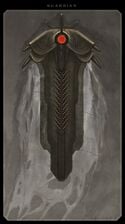
The idea of Forerunner constructs known as "Guardians" dates back to the development of Halo 3, with many pieces of concept art created for their design. These Guardians were to feature as enemies in the eponymous level Guardian Forest.[46][47] Unfortunately, the level and the Guardian enemy had to be cut, with the environment being repurposed as the Guardian multiplayer map and the Guardian enemy model itself used on Epitaph in holographic form. While not seen in the final game, the Guardian design was later used in Origins for two Forerunner constructs seen escorting a Keyship to the Excession.[48] Another hologram of this design of Guardian appears in Halo Infinite as a representation for Offensive Bias.[49]
The Guardians' first major appearance in the Halo series was as a major plot element (and origin of the name for) Halo 5: Guardians. In Halo 5, these Guardian Custodes were vastly different in design, resembling birds moreso than the monolithic Sentinels. Early in the development of Halo 5: Guardians, the Guardians were known internally as "Titans", and went through heavy design iteration.[50][51] By mid-2013, the bird design had become semi-final, and can be seen in the Halo Xbox One announcement trailer and Halo 2: Anniversary bookend cutscenes, though the final design in Halo 5: Guardians was changed radically. There was considerable speculation as to the nature of the constructs prior to the confirmation of them as the titular Guardians in Game Informer's June 2015 issue. When asked about the construct seen in the Halo 5: Guardians key art on Twitter, the game's Creative Director Josh Holmes alluded to the name by replying that "The answer is in plain sight."[52]
Gallery[edit]

|
Browse more images in this article's gallery page. |
Concept art[edit]
Early concept art of the Guardian still retaining legs for Halo 5: Guardians.
Pre-production concept art of a Guardian in Halo Infinite.
Images[edit]
A Guardian in the Halo Xbox One announcement trailer.
Thel 'Vadam studying a holographic render of the Guardian in Halo 2: Anniversary's prologue.
The aftermath of a Guardian at Conrad's Point.
A Forerunner symbol for the Guardian in Hunt the Signal.
A Meridian city being destroyed by a Guardian in mere seconds in A Hero Falls.
A Guardian shown to scale with the Master Chief, several Promethean constructs, and the Space Needle in Seattle.
Jameson Locke observing a Guardian during the Battle of Sunaion.
Meridian's Guardian in Halo Mythos.
A Guardian and a Halo ring in the Halo Coloring Book.
A Guardian in Halo: Legacy of Onyx.
List of appearances[edit]
- Halo 2: Anniversary (First appearance) (Hologram only)
- Hunt the Truth
- Halo 5: Guardians
- Halo Mythos
- Halo: Fractures
- What Remains (Mentioned only)
- Rossbach's World
- Halo Wars 2
- Halo: Legacy of Onyx
- Halo: Bad Blood
- Halo: Shadows of Reach (Mentioned only)
- Halo: Point of Light
- Halo: Divine Wind (Mentioned only)
- Halo Infinite
- Story Shard: Precipice (Simulation only)
- Halo: Outcasts
- Halo: Epitaph
- Halo: The Third Life
- Halo: Anvil Accord (Mentioned only)
- Halo: The Machine Breaks (Mentioned only)
- Halo: Empty Throne
- Halo: Moonrise Over Mombasa (Mentioned only)
- Halo: Fifth Canticle
- Halo: Edge of Dawn (Mentioned only)
Sources[edit]
- ^ a b c d e f g h i j k Halo Waypoint, Guardian (Retrieved on Jan 25, 2016) [local archive] [external archive]
- ^ a b c d Halo 5: Guardians, campaign level Genesis
- ^ a b c d e f g h i j k l m n o p q r s t u v w Halo: Warfleet, page 88-89
- ^ a b c d e f g h i j k l m Halo Encyclopedia (2022 edition), page 386-387
- ^ YouTube - Ready Up Live, I PLAYED Halo 5 CAMPAIGN! | EXCLUSIVE Info and Screenshots
- ^ a b Halo Infinite, campaign level Silent Auditorium
- ^ a b Halo Encyclopedia (2022 edition), page 357
- ^ a b Halo Encyclopedia (2022 edition), page 209
- ^ a b Halo Encyclopedia (2022 edition), page 397
- ^ a b Halo 5: Guardians, campaign level Unconfirmed
- ^ a b Halo 5: Guardians marketing, The Hunt Begins
- ^ Halo 5: Guardians, campaign level Battle of Sunaion
- ^ a b c d e Halo 5: Guardians, campaign level Guardians
- ^ Halo: Fractures - Rossbach's World
- ^ a b Halo 5: Guardians, campaign level Evacuation
- ^ Halo: Bad Blood, chapter 6
- ^ Halo: Warfleet, page 80
- ^ a b c Halo Infinite, campaign level Repository
- ^ Halo 2: Anniversary, The Heretic: Target Locke
- ^ Halo: Outcasts, chapter 2
- ^ a b c Halo: Outcasts, chapter 17
- ^ Halo Waypoint - Universe, Locations, Sunaion (Retrieved on Apr 13, 2016) [local archive] [external archive]
- ^ Halo: Legacy of Onyx, chapter 3
- ^ Halo 5: Guardians marketing, Hunt the Signal
- ^ Halo 5: Guardians, campaign level Osiris
- ^ Halo 5: Guardians, campaign level Enemy Lines
- ^ a b Halo: Bad Blood, chapter 1
- ^ Halo: Bad Blood, chapter 15-20
- ^ a b Halo: Fifth Canticle
- ^ Halo: Legacy of Onyx, Epilogue
- ^ Halo Wars 2, campaign level Last Stand
- ^ Halo: Shadows of Reach, Epilogue
- ^ a b Halo Encyclopedia (2022 edition), page 446-447
- ^ Halo Encyclopedia (2022 edition), page 211
- ^ Halo: Outcasts
- ^ Halo: Outcasts, chapter 24
- ^ a b Halo: Outcasts, chapter 19
- ^ Halo Infinite, campaign level Warship Gbraakon
- ^ Halo Infinite, Destroyed Guardian in the open world.
- ^ Halo: Empty Throne, chapter 19
- ^ Halo: Empty Throne, chapter 20
- ^ Halo Waypoint, Canon Fodder - Legendary Endings (Retrieved on Dec 19, 2021) [archive]
- ^ Precipice: Part 1
- ^ Halo 5: Guardians, Mission Intel: UNSC Marine Status Update
- ^ Halo: Bad Blood, chapter 14
- ^ GDC Vault, Building Your Airplane While Flying: Production at Bungie (Retrieved on Jun 1, 2020) [archive]
- ^ Bungie.net, Building Your Airplane While Flying: Production at Bungie: Original presentation download (Retrieved on Jun 1, 2020) [archive]
- ^ Halo Legends - Origins
- ^ Halo Waypoint, Inside Infinite - April 2021 (Retrieved on Apr 30, 2021) [archive]
- ^ ArtStation, TITAN (Retrieved on Jun 1, 2020) [archive]
- ^ Axis Animation, Halo Xbox One (Retrieved on Jun 1, 2020) [archive]
- ^ Twitter, Josh Holmes (@JoshingtonState): "The answer is in plain sight." (Retrieved on Apr 13, 2016) [archive]
| ||||||||
